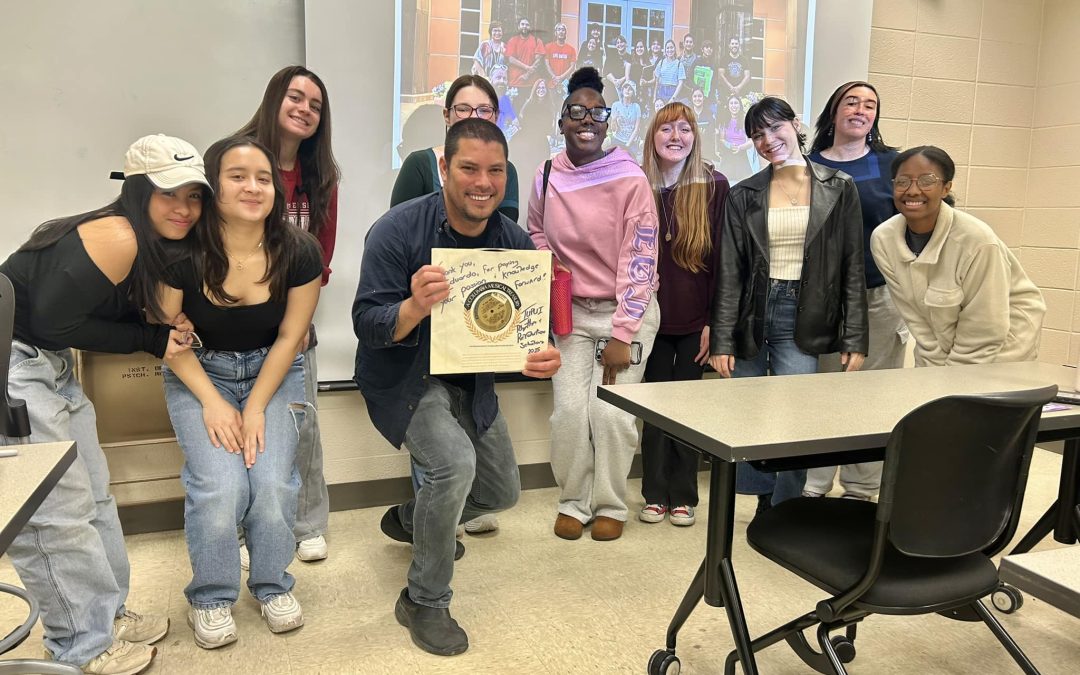By Paige Sylvester
In a world where cultural identity can often be diluted in the name of assimilation, Eduardo Luna stands as a passionate advocate for celebrating and preserving heritage. As the founder of Arte Mexicano en Indiana, a nonprofit organization based in Indianapolis, Luna is a driving force in uplifting Mexican and Latin American culture through the arts. His journey from Acapulco, Mexico to the American Midwest is not just a personal story; it’s a mission to remind people, especially younger generations, that their heritage matters.
Luna visited the IUI Rhythm and Revolution class recently as a guest speaker, and his presentation offered an inspiring and honest look at the challenges and victories he has faced as an artist and community organizer. He spoke with conviction about how growing up in the U.S. often meant being encouraged to forget one’s roots. Like many immigrants, he experienced the pressure to conform to the American “melting pot” ideal. In reference to mainstream culture diminishing ethnic identities, he said, “They try to detach you from your heritage.” For many young Mexican-Americans, Luna observed, this means navigating a society where their culture is stereotyped, undervalued, or even vilified. The portrayal of Latinx in mainstream media, particularly negative depictions of Mexicans in political rhetoric, creates an environment in which children are taught, both explicitly and implicitly, to be ashamed of where they come from. It’s this emotional and psychological impact that fuels his work.
In response to these challenges, Luna created Arte Mexicano en Indiana five years ago. The organization, a 501(c)(3) nonprofit, is dedicated to the promotion and celebration of Mexican culture through art, music, dance, and food. It collaborates with a wide variety of institutions and community groups, from museums and libraries to independent artists and musicians. Through these partnerships, Arte Mexicano en Indiana brings Latin-American cultural expression into public spaces where it is often underrepresented. Before founding Arte Mexicano en Indiana, Luna was deeply involved with Nopal Cultural, an initiative focused on multicultural arts with a specific emphasis on enhancing Latin-American arts in Indianapolis. Nopal Cultural laid the groundwork for what would later become Arte Mexicano en Indiana, helping Luna build connections with artists and organizations who shared his passion for cultural advocacy.
One of Luna’s most notable projects came when the Eiteljorg Museum in Indianapolis opened an exhibit focused on guitars; but surprisingly, none of the guitars were Spanish. Seeing this gap, Luna launched an initiative to incorporate Latin culture into the museum’s programming. His efforts resulted in events that celebrated the traditional Spanish guitar, as well as other musical forms rooted in Latin America. Luna’s approach is both creative and bold. He’s not afraid to push boundaries or challenge institutions to do better. Tired of waiting for predominantly white-led organizations to acknowledge Latinx communities, Luna has taken it upon himself to build the spaces and events that reflect the richness of his culture. One of the most popular and community-driven events Luna has organized is the Indychitlan Festival, which brings together Latin musicians, artists, food vendors, and cultural advocates for a day-long celebration of Latin identity. This festival, among many others, has become a cornerstone for Arte Mexicano en Indiana, showcasing not only entertainment but
education about Latinx heritage.
Another unique event that Luna organized was a Mexican wrestling match—Lucha Libre—held at the Central Library in downtown Indianapolis. Events like these are representative of Luna’s vision: using unconventional, attention-grabbing activities to spark curiosity and encourage people to learn more about Latin American traditions.
Most of the organization’s work is concentrated on the west side of Indianapolis, where a significant portion of the city’s Latinx population resides. By rooting their activities in this area, Arte Mexicano en Indiana ensures that its programming is accessible to the people who need it most. Whether it’s a music workshop, an art exhibit, or a food fair, Luna’s goal is to create spaces where people can feel proud of their culture and heritage.
Throughout his talk with the IUI Rhythm and Revolution scholars, Luna also reflected on the personal stories that have shaped his mission. He spoke about his father, who once dreamed of becoming a musician in Mexico City. Though those dreams weren’t fully realized, they live on through Luna’s work. Arte Mexicano en Indiana also works with organizations like the Mexican Cultural Arts Alliance (MCAA), collaborating on initiatives that further expand opportunities for Latinx artists and cultural leaders. By building these networks, Luna ensures that his organization is not working in isolation but is part of a larger movement to elevate underrepresented voices in the arts.
What stands out most about Eduardo Luna is not just his tireless dedication, but the joy and pride he brings to every project. He believes deeply in the power of culture to heal, to inspire, and to bring people together. In a country that often marginalizes minority communities, Luna’s work is an important reminder that cultural expression is a necessity. Listening to Luna speak was both educational and deeply moving. His work shows how art can be used not just for decoration or entertainment, but as a form of activism. In sharing his own experiences, he gave us all a window into the struggles and triumphs of maintaining cultural identity in a society that doesn’t always value it. For anyone who has ever felt the pressure to fit in by forgetting where they come from, Luna’s message is clear: your culture is your strength. And through Arte Mexicano en Indiana, Luna is helping countless others rediscover and reclaim that strength every day.
In the end, Eduardo Luna’s legacy isn’t just about the events he organizes or the art he showcases; it’s about building a community where people can be unapologetically themselves. That’s a lesson all of us, regardless of our background, can learn from.
